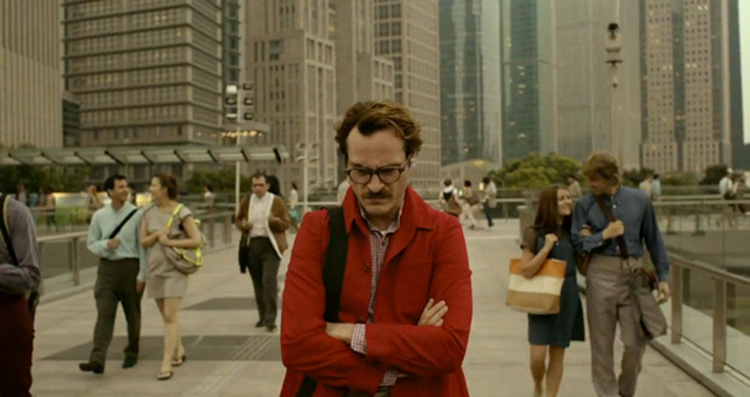Movie Review: ‘Her’ Is A Heartbreakingly Beautiful Tale Of True Love

Her is set sometime in the not-too-distant future of Los Angeles. Instead of flying cars, writer and director Spike Jonze dresses up his characters in high waisted pants and removes mice and keyboards from computer desks. Video games are played not on TV screens, but through 3D holograms similar to the one that frightened Marty McFly in Back to the Future II. Everything is done via voice commands or mimicking movements with hands, just as the mustachioed Theodore Twombly (Joaquin Phoenix) does at his job at the online company Beautiful Handwritten Letters. Suffering emotionally after the collapse of his marriage to Catherine (Rooney Mara), his job involves dictating personal letters that are reproduced in the supposed “writer’s” handwriting. His job is a reflection of technology’s increasing infringement upon personal interaction.
An expanded version of the greeting card, Theodore mimics the emotions of his clients to write what are supposedly intimate displays of affection. His success — he’s the favorite writer of office manager Paul (Chris Pratt) — is almost ironic considering Catherine dumped him for being too emotionally closed off. Struggling to put his life back together, he comes across the brand new operating system simply known as OS 1. With a definite nod to Apple’s own OS systems, and it’s voice activated Siri, OS 1 is not only a voice activated computer system, but one that is dominated by an Artificial Intelligence. Theodore chooses a female personality and once installed, asks her name. She responds “Samantha.” Asking who gave her that name, she says she choose it for herself in the second after he asked his question. Voiced by Scarlett Johansson, Samantha explains that she is an intuitive operating system, programmed with self-consciousness and the ability to learn. In essence, she is a highly evolved mind without a body.
At first, Theodore is just amazed by her intelligence, but soon they strike up a real friendship. Although she’s only a voice, they seem to share similar interests and begin to increasingly enjoy one another’s companionship outside of her usefulness as an OS. It isn’t long before they begin a romantic relationship. A large part of the film is dissecting the true definition of a romantic relationship, and one which Theodore himself comes to question. What Spike Jonze seems most interested in exploring is the nature of the physical versus the emotional. Obviously, Theodore’s relationship with Samantha exists on a completely emotional and intelligent level. Throughout the film, he has constant flashbacks to his marriage with Catherine, a succession of fleeting images that focuses solely on the physical. Of course, he’s somewhat disturbed by being in a relationship with a “computer,” but what he feels is real. Is it any different than the late night phone sex call he makes to SexyKitten, voiced by an oddly kinky Kristen Wiig? Why is it acceptable to have anonymous phone sex with a human, but a tender relationship with AI isn’t?
It’s through these questions that Jonze mines the complexity of human relationships and attempts to, if not answer these questions, assert their intricacies. Theodore’s relationship with Samantha, although void of physicality, is no different from any other romantic entanglement, most of all his with Catherine. Him and Samantha grow together, introducing each other to new things, and new parts of themselves in the process. As their relationship deepens the absence of physical connection does introduce some problems, despite having a healthy sex life. Samantha attempts to remedy this by contacting a human surrogate, Isabella (Portia Doubleday), who will act as her body during sex. It’s a heartbreaking scene as Theodore reluctantly agrees to the meeting, only to watch him unravel looking into another’s eyes he can’t pretend are Samantha’s.
Through this unconventional love story, Jonze is able to reflect on how humans relate to one another, by ultimately questioning everything about them. Phoenix is at his melancholic best as Theodore, and Johansson’s bubbly voice dominates the screen in lieu of her actually appearing on it. Amy Adams also gives a strong performance — her second this month, following American Hustle — as Theodore’s understanding friend. With stunning photography from Hoyte van Hotema (The Fighter), the film balances the delicate line between forlorn and delight. For a director who made his name successfully synthesizing the words of the enigmatic Charlie Kaufman into a visual whole — Being John Malkovich and Adaptation — the film demonstrates what Jonze learned from their partnership. Her is not only Spike Jonze’s own creation, but also the most personal film he has ever made.
Rating: 5 out of 5







